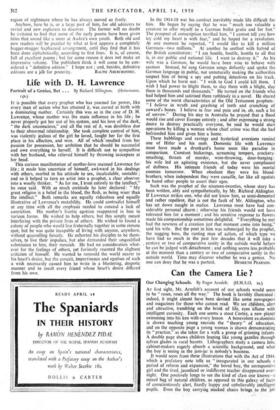Can the Camera Lie ?
Our Changing Schools. By Roger Armfelt. (H.M.S.°. as.) AT first sight, Mr. Armfelt's account of our schools would seem to be " roses, roses-all the way." The book is lavishly illustrated ; indeed, it might almost have been devised like some newspapers and magazines for those who cannot read.- We see children, alert and attractive, trembling on the brink of life, eyes aflame with intelligent curiosity. Each one seems a stout Cortez, a new planet swimming into his ken with every lesson. A benevolent ex-dominie is shown teaching young recruits the " theory " of education, and on the opposite page a young woman is shown demonstrating its " practice," as she takes for a walk a group of grinning infants. A double page shows children leaping like young gazelles through sylvan glades in rural haunts. Lithographers study a camera lens, cabinet-makers eagerly absorb a scientific background, and what the boy is seeing in the jam-jar is nobody's business.
It would seem from these illustrations that with the Act of 1944, which a prefatory note tells us " inaugurated in our schools a period of reform and expansion," the bored boy, the unresponsive girl and the tired, jaundiced or indifferent teacher disappeared over- night. One positively longs to see the kind of class one knows—a mixed bag of natural children, as opposed to this galaxy of faces of conscientiously alert, fixedly happy and unbelievably intelligent pupils. Even the boy carrying_ stacked chairs brings_ to .the job an air of cerebral concentration which many a sixth-form master would welcome but rarely sees.
If the Ministry's purpose in issuing this book was to sell to parents the " brave new world " of education in process of establishment by the Butler Act, they made -a wise choice in entrusting the job to Mr. Armfelt. He has not only known the educational scene from more stand-points than perhaps any man in the country— as teacher, inspdctor, chief education officer, secretary of the School Broadcasting Council, and now as Professor of Education at Leeds—but he is also a novelist. In this latter capacity he creates fictitious characters who discuss and ask facile questions in simple dialogue about education. Mr. Green, " a smart young man, who knew a lot," deals summarily with the Three Rs. " You see, the Three Rs don't loom so large nowadays. . . . We don't go chasing them. We say that if we set about educating in the right way, they will come in due time of their own accord." This fascinating statement seems to suggest that since 1944 pupils in some mysterious way have become deft miracles of spontaneous gumption. Perhaps the Three Rs are coming " of their own accord " to the children photographed gambolling through tuft and fern. Perhaps they do not come—which would account for the protests of dismay from the military authorities that their recruits are unable to write or spell in these our so enlightened days. Mr. Evelyn Waugh is reported as having complained that " nobody under twenty-five can write an English sentence with two subordinate clauses without making at least six faults in grammar for which in older days he would have been birched." This may be exaggeration for emphasis, but its truth is incontestable. Young people cannot be changed by Act of Parliament, and the natural child still needs both carrot and stick, if he is to profit from a process which involves sober discipline as well as fun and games. JOHN GARRETT.







































 Previous page
Previous page